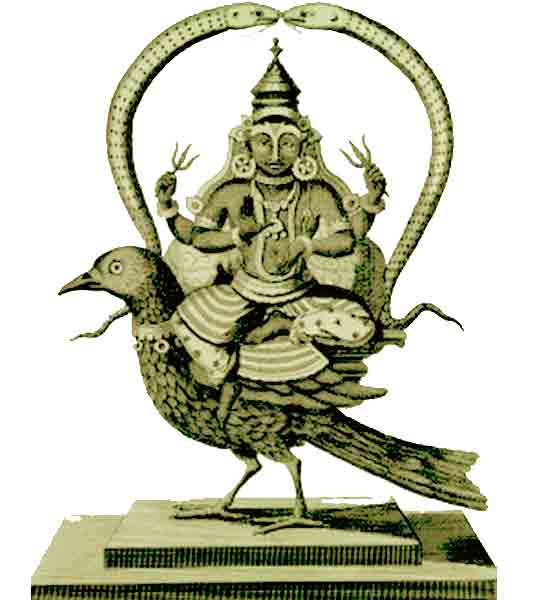
Shani Shothram - A Prayer to Shani

Aum, Sri Mahaaganaadhipataye Namah
Guidelines for pronunciation are in the footnotes
Shani is the planetary god of Saturn whose position in the astrological chart of an individual plays an important role in his or her destiny. Depending upon his position and strength, he may exert either positive or negative influence upon the lives of mortals. Although it is not easy to please him, the adverse influence of Shani can be reduced by invoking him and praying to him. There are temples in India where Shani is the presiding deity and where he is worshipped with offerings of vegetable oil, flowers and food. Those who read the following prayer everyday at morning experience prosperity and auspiciousness and stay free from the adverse influence of Shani.
Shani Sthothram
aum namaha krishnaaya neelaaya sithikanttha nibhaayacha
namah kalaagni ruupaaya krthaanthaayacha vai namaha
namo
nirmamsa dehaaya deerghashmashru jataayacha
namo vishaala-nethraaya
sthularomnecha vai punaha
namo deerghaya shushkaaya kaaladamshtra namosthuthe
namasthe
kotaraakshaaya durnireekshaaya vai namah
namo neela madhuukaaya
neelothpalanibhaayacha
namo ghoraaya raudraaya bheeshanaaya
karaaline
namasthe sarvabhakshaaya baleemukha namosthuthe
suuryaputhra
namasthe'sthu bhaaskare'bhadayacha
adhodhrshte namasthe'sthu
samvarthaka namosthuthe
namo mandagathe thubhyam nisrimshaaya
namosthuthe
thapasaaraga dehaaya nithyam yogarathaayacha
namo nithyam
kshudhaarthaaya athrpthaayacha vainamaha
jnaanachakshu rnmasthe'sthu kasyapaathmaja suunave
thushnodadaashivai
raajyam rushnoharasi thakshnaath
devaasura manushaashcha siddha vidyaadharoragaah
thvayaavilookithaa
ssarvenaasham yaathi samuulathaha
prasaadam kurume deva vararho'ha mupaagathaha
namasthe
konasamsthaaya, pingalaaya namosthuthe
namasthe babhru-ruupaaya, krishnaayacha namosthuthe
namasthe
raudradehaaya, namasthe chaanthakaayacha
namasthe yamasaujnaaya, namasthe sauraye vibho
namasthe
mandaruupaaya, sanaischara namosthuthe
prasaadam mamadevesa,
deepasya pranathasyacha
Suggestions for Further Reading
- A Prayer During a Pradakshina at a A Hindu Temple
- Ganapathya Atharvashirsham
- Shri Ganesha Ashtotthara Sathanama Puja
- Everyday Prayers to Lord Ganesha
- Maha Ganesha Pancha-ratnam
- A Morning Prayer to Lord Ganesha
- Sankata-naasana Ganapathi Sthothram
- A Hindu Prayer, Ganeshashtakam
- Ganesha Shodhasa Naama Puuja
- Sri Krishna Ashtakam
- Sri Krishna Dvadasanama Sthothram
- Mahamrtyunjaya Mantram
- Navagraha Dhyana Slokam
- Popular Mantras and Prayers
- Salutations to Dikpalas, Rishis and Devathas
- Shani Shothram - A Prayer to Shani
- Popular Prayers of Shakti, Devi, Mother Goddess
- English Devotional Prayers to Hindu Gods and Goddesses
- Popular Prayers of Lord Ganesha
- Popular Prayers of Lord Krishna
- Popular Prayers of Goddess Lakshmi
- Navagraha Dhyana Slokam
- Popular Prayers of Vishnu
- The Dream and Despair of a Yogi
- The Idolaters - The Idol(H)aters
- Chidlren of Darkness - Kali Yuga
- Devotional Prayers to Lord Shiva
- The Vedas as the Source of Valid Knowledge
- Hymns from the Rig Veda
- The Meaning and Concept of Mantra in Hinduism
- Praying With the Right Attitude
- Why and How Should We Pray? The Prayer Purpose
- Essays On Dharma
- Esoteric Mystic Hinduism
- Introduction to Hinduism
- Hindu Way of Life
- Essays On Karma
- Hindu Rites and Rituals
- The Origin of The Sanskrit Language
- Symbolism in Hinduism
- Essays on The Upanishads
- Concepts of Hinduism
- Essays on Atman
- Hindu Festivals
- Spiritual Practice
- Right Living
- Yoga of Sorrow
- Happiness
- Mental Health
- Concepts of Buddhism
- General Essays
Guidelines to pronunciation: Sanskrit is essentially a language of sounds and sound vibrations. The efficacy of Sanskrit prayers depends upon the vibrations that are produced during chanting. It is difficult to transliterate Sanskrit words into English with full justification to the original sounds. In the above stated transliteration we followed a simple approach to make it easier even for those who are not familiar with English or Sanskrit. Wherever you find repeat vowels (aa, uu, ee) please stretch the vowel sound (for ex., aa as in vast or path, uu as in cool or root, ee as in eel or feel). Similarly, "ai" should be pronounced as in gait, fight, or tight. Th should be pronounced as in think or thick, but when t alone is used, it should be pronounced as in two, top or tip.